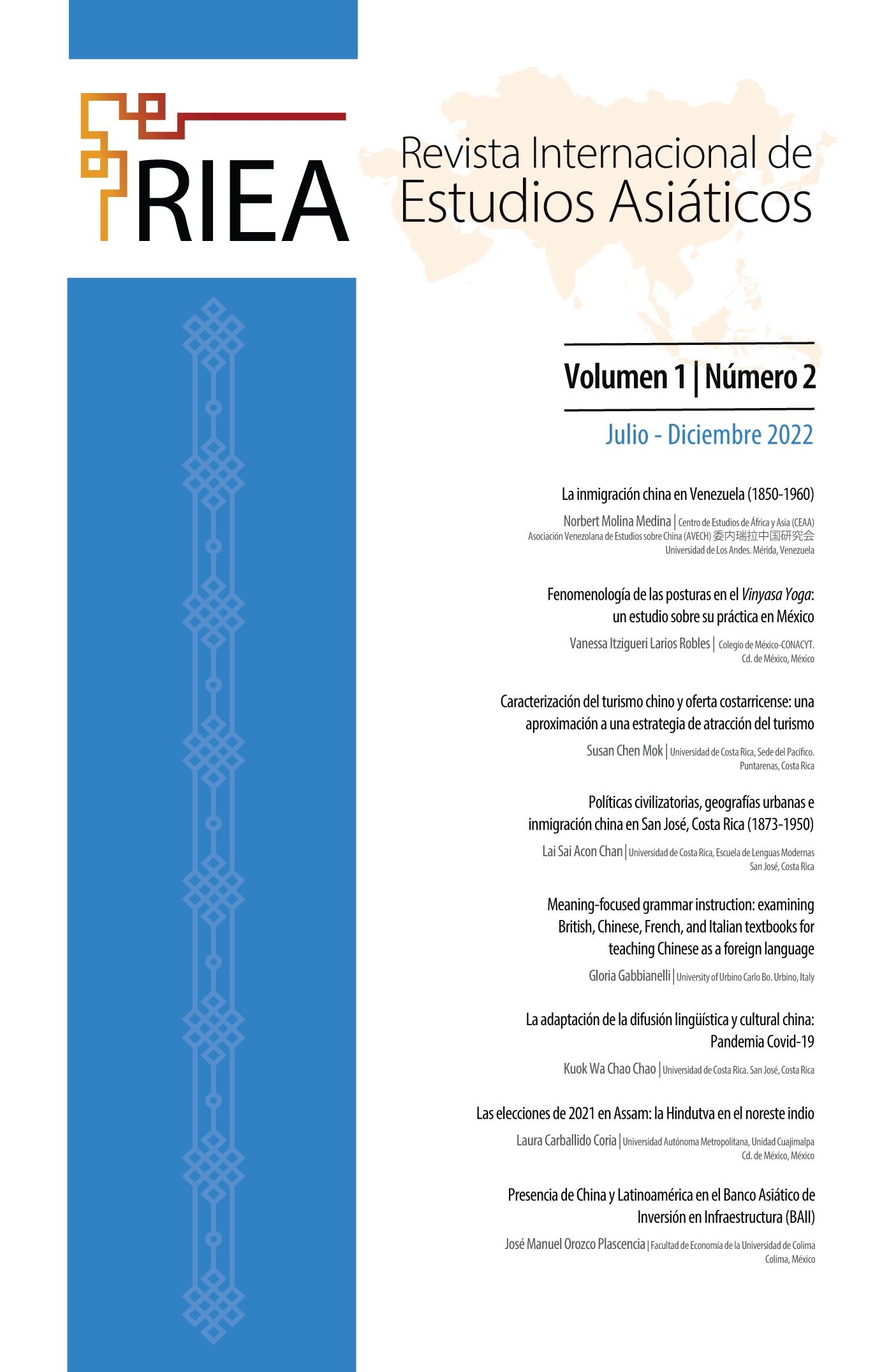Abstract
The Confucius Institute in Costa Rica (IC-UCR) has a Program for the Dissemination of Chinese Culture (PDCC). During the Covid-19 pandemic, the PDCC had to adapt to this new reality in order to continue working normally. This research aims, on the one hand, to document the adaptation that the teachers had to continue teaching Chinese language and, on the other hand, to describe the cultural activities carried out during the pandemic. This is an exploratory qualitative study with teachers and participants in cultural activities. The questionnaire and the focus group were used as data collection instruments. As main results, it was obtained that the teachers resorted to the use of information and communication technologies (ICT) to continue the educational process. Also with the ICT, a variety of cultural activities with a very varied theme were carried out.
References
Adell, Jordi. “Tendencias en educación en la sociedad de las tecnologías de la información”.
Revista Electrónica de Tecnología Educativa 7 (1997): 1-21. http://www. edutec.es/revista/index.php/edutec-e/article/view/570/299
Ahumada Ebratt, Dayson David. “El uso TIC’s en el proceso de enseñan- za-aprendizaje del
alemán como lengua extranjera en la universidad”. Revista Boletín RE- DIPE 10, no 5 (2021): 248-258. https://doi.org/10.36260/rbr. v10i5.1301
Armesto, Miguel, Rony Vallejos y Elma Valdivia. “Revisión sistemática sobre la educación remota universitaria latinoamericana en pande- mia”. Cuadernos de desarrollo aplicadas a las TIC 10, no 4 (2021): 63-87. http://doi.org/10.17993/3ctic.2021.104.63-87
Ávila Díaz, William Darío. “Hacia una reflexión histórica de las TIC”.
Hallazgos 10, no
(2013): 213-233. http://www.redalyc.org/pdf/4138/413835217013. pdf
Banks,Mark.“Theworkofcultureand C-19”. EuropeanJournalofCultural Studies 23, no 4 (2020). http://doi.org/10.1177/1367549420924687
Betzler, Diana, Ellen Loots, Marek Prokupek, Lénia Marques y Petja Grafenauer. “Covid-19 and the arts and cultural sectors: investigat- ing countries’ contextual factors and early policy measures”. Inter- national Journal of Cultural Policy 27, no 6 (2020): 796-814. http:// doi.org/10.1080/10286632.2020.1842383
Builes Roldán, Isabella, Horacio Manrique Tisnés y Carlos Mario He- nao Galeano. “Individuación y adaptación: entre determinaciones y contingencias”. Nomadas. Critical Journal of Social and Jurid- ical Sciences 51, no 2 (2017): 1-23. http://dx.doi.org/10.5209/ NOMA.55009
Castillo Sanguino, Narciso. “TIC y cultura: la ineludible apropiación de las TIC en la escuela de zonas indígenas”. Revista Digital de Inves- tigación Educativa 4, no 8 (2013): 72-87. http://education.esp.ma- cam.ac.il/article/945
Enriquez, Alberto y Carlos Sáenz. Primeras lecciones y desafíos de la pan- demia de Covid-19 para los países del SICA. México: CEPAL, 2021. Flick, Uwe. Introducción a la investigación cualitativa. Madrid: AIDEIA,
Fernández Martín, Patricia. “La enseñanza de lenguas extranjeras a través de las nuevas tecnologías: reflexiones y propuestas”. Thélème Revista Complutense de Estudios Franceses 33, no 2 (2018): 139-158. http:// dx.doi.org/10.5209/THEL.59585
Fuad, Muhammad, Farida Ariyani, Edi Suyanto y Ari Syahidul Shidiq,. “Exploring teachers’ TPCK: are Indonesian language teachers ready for online learning during the Covid-19 outbreak?”. Universal Jour- nal of Educational Research 8, no 11B (2020): 6091-6102. http:// doi.org/10.13189/ujer.2020.082245
Garrido López, María. “Las TIC y la enseñanza de lenguas extranjeras”. Tesis de trabajo de fin de grado en filología, Universidad de Jaén, 2015.
Hodges, Charles, Stephanie Moore, Barb Lockee, Torrey Trust y Aar- on Bond. “The difference between emergency remote teaching and online learning”. Educause review (2020). https://er.educause.edu/ articles/2020/3/the-difference-between-emergency-remote-tea- ching-and-online-learning
López-Morocho, Luis Rodolfo. “Educación remota de emergencia, virtualidad y desigualdades: pedagogía en tiempos de pandemia”. Digital Publisher 5, no 5 98-107 (2020). http://doi.org/10.33386/ 593dp.2020.5-2.347
Lutz, Bruno. “La acción social en la teoría sociológica: una aproxima- ción”. Nueva época 23, no 64, 199-218 (2010). https://www.redalyc. org/pdf/595/59518491009.pdf
Martín Varisto, Yanel, Andrés Pinassi, Martín Larrea, Astrid Bjerg y Damián Flores Choque. “TICS y difusión del patrimonio cultural. Realidad aumentada y virtual en el área fundacional de Bahía Blan- ca”. Realidad, tendencias y desafíos en turismo 10 (2012): 53-73. http://cs.uns.edu.ar/-mll/web/files/papers/Print.pdf
Martínez Carazo, Piedad Cristina. “El método de estudio de caso: estra- tegia metodológica de la investigación científica.” Pensamiento y Ges- tión, no 20 (2006): 165-193. http://redalyc.org/pdf/646/64602005. pdf
Moorhouse, Benjamin y Kohnke, Lucas. “Responses of the En- glish-Language-Teaching community to the Covid-19 pan- demic”. RELC Journal 52, no 3 (2021): 359-378. http://doi. org/10.1177/00336882211053052
Morales González, Celia y Portilla Luja, María de las Mercedes. “La emer- gencia cultural en México y el Covid-19; Desafíos presentes y futu- ros”. RUIIEc 6 (2020): 401-414. http://ru.iiec.unam.mx/5230/
Pamintuan, Cavin. “Reducing the impact of pandemic on Chinese lan- guage education in the Philippines through the localization of Chi- nese teachers”. International Journal of Language Education 5, no 4 271-284 (2021): 401-414. http://doi.org/10.26858/ijole.v5i4.19320
Pinheiro, Viviane y Beatriz Guedes. “Educação remota emergencial na formação inicial docente: desafíos e posibilidades no contexto da pandemia de Covid-19”. Revista educación superior y sociedad 33, no 2 (2021): 525-553. https://doi.org/10.54674/ess.v33i2.470
Pinochet Cobos, Carla, Tomás Peters y Victoria Guzmán. “La crisis CO- VID en el sector cultural chileno: estrategias de acción colectiva y políticas culturales desde abajo”. Revista de Estudios Sociales 78, no 10 (2021): 14-33. http://doi.org/10.7440/res78.2021.02
Portillo Peñuelas, Samuel Alejandro, Lidia Isabel Castallanos Pierra, Oscar Ulises Reynoso González y Omar Iván Gavotto Nogales. “Enseñanza remota de emergencia ante la pandemia Covid-19 en educación media superior y educación superior”. Propósitos y Re- presentaciones 8, no 3 (2020): 1-17. http://dx.doi.org/10.20511/ pyr2020.v8nSPE3.589
Vega Vivar, Beatriz. “Uso de las TIC en el aula de lenguas extranjeras en educación primaria”. Tesis de maestría en educación primaria, Uni- versidad de Cantabria, 2016.
Venzhynovych, Natalia, Mykhaylo Poluzhyn, Veronika Banyoi y Olesya Kharkivska. “Means of foreign language teaching during Covid-19 pandemic in Ukraine”. Arab World English Journal 1 (2021): 95-
http://dx.doi.org/10.24093/awej/covid.7
Villena Fiengo, Sergio. “Covido Ergo Zoom, la cultura en tiempos de pandemia”. Revista de gestión cultural 15 (2020): 68-75. https:// www.academia.edu/44183175/Covido_ergo_zoom_La_cultura_ en_tiempos_de_pandemia_Apuntes_preliminares_p%C3%A1gi- nas_67_75

